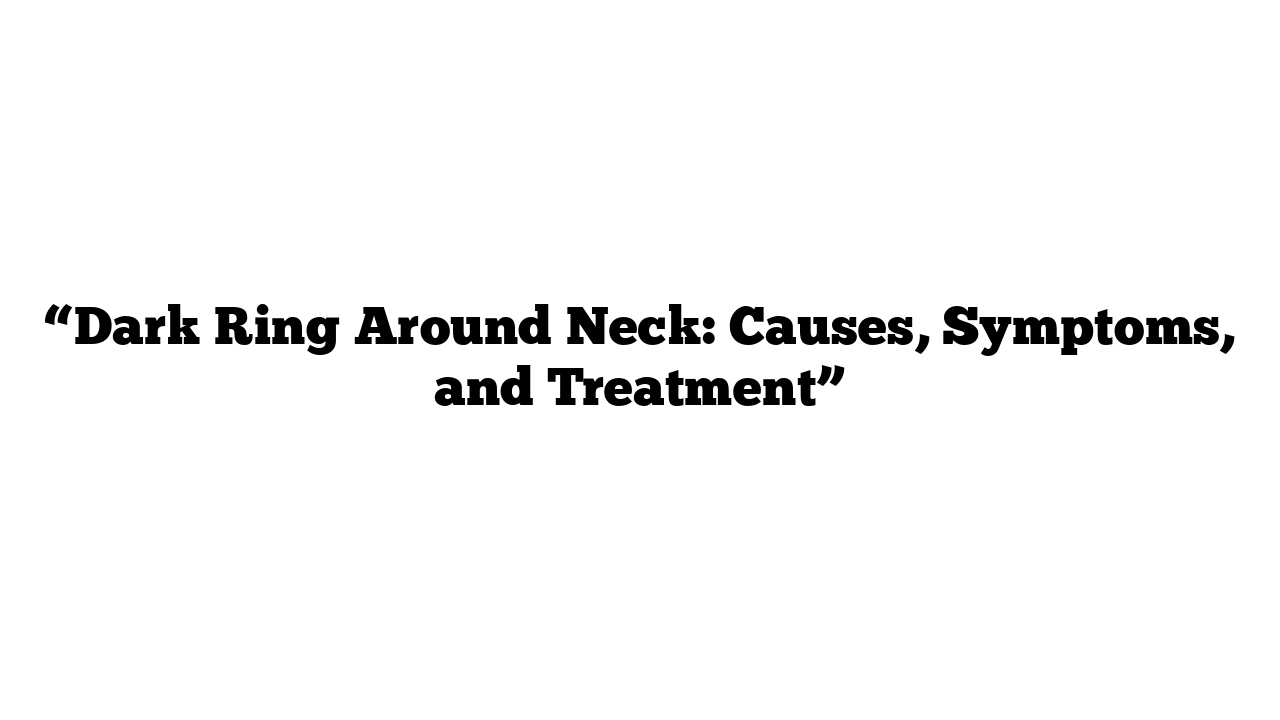A dark ring around the neck can be concerning, but it’s often a sign of an underlying condition that may need attention. This discoloration, medically known as acanthosis nigricans, is not just a cosmetic issue; it can also indicate metabolic or hormonal imbalances. Here’s a detailed look at its causes, symptoms, and treatments.
What Is a Dark Ring Around the Neck?
A dark ring or discoloration around the neck refers to patches of skin that are darker and thicker than the surrounding area. It often feels velvety and may look like dirt, but scrubbing doesn’t remove it.
This condition is common in the USA, particularly among people with certain risk factors like obesity and diabetes.
Common Causes of Dark Neck
1. Acanthosis Nigricans (AN)
The most frequent cause, AN, is associated with:
- Insulin Resistance: Seen in people with prediabetes, Type 2 diabetes, or obesity.
- Hormonal Disorders: Conditions like polycystic ovary syndrome (PCOS) can trigger dark neck.
2. Poor Hygiene
While rare, accumulation of sweat, dirt, or oil can sometimes mimic a dark ring.
3. Skin Conditions
- Eczema or psoriasis can cause discoloration.
- Post-inflammatory hyperpigmentation occurs after skin irritation or inflammation.
4. Certain Medications
Drugs like oral contraceptives, steroids, or nicotinic acid can lead to skin darkening.
5. Rare Causes
- Cancer-Related Acanthosis Nigricans: Though uncommon, a dark neck could signal an underlying malignancy.
- Genetics: Family history can play a role in the condition.
Symptoms of a Dark Ring Around the Neck
The key signs include:
- Thickened, velvety skin around the neck.
- Dark brown or black patches of skin.
- Itchiness or irritation (in some cases).
This discoloration may also appear in other areas, like the armpits, groin, or elbows.
Diagnosing the Cause
A doctor will evaluate your medical history, perform a physical exam, and may recommend:
- Blood Tests: To check for insulin resistance, diabetes, or hormonal imbalances.
- Skin Biopsy: Rarely done, but used to rule out other skin conditions or cancer.
Treatment Options for Dark Neck
1. Addressing the Underlying Cause
- Insulin Resistance: Managing diabetes through diet, exercise, and medication is key.
- Hormonal Imbalances: Treating conditions like PCOS can reduce skin discoloration.
2. Skin Care Treatments
- Topical Creams: Products with retinoids, salicylic acid, or lactic acid can lighten the skin.
- Exfoliation: Gentle exfoliation helps remove dead skin cells.
- Chemical Peels: Supervised by a dermatologist, peels can improve skin tone.
3. Lifestyle Changes
- Weight Loss: Losing weight improves insulin sensitivity and can reduce the appearance of acanthosis nigricans.
- Healthy Diet: Focus on whole foods and reduce sugar intake.
- Regular Exercise: Promotes weight loss and better blood sugar control.
4. Cosmetic Treatments (Optional)
- Laser Therapy: Helps lighten the skin.
- Microdermabrasion: Removes the top layer of skin to reduce discoloration.
Preventing Dark Rings Around the Neck
1. Maintain a Healthy Lifestyle
- Keep blood sugar levels under control.
- Maintain a balanced diet and stay physically active.
2. Skin Hygiene
- Wash your neck regularly with a gentle cleanser.
- Apply moisturizer to keep your skin hydrated.
3. Avoid Triggers
- Limit exposure to harsh chemicals or fragrances.
- Use sunscreen to protect the neck area from further darkening.
When to See a Doctor
Consult a healthcare provider if:
- The discoloration appears suddenly.
- It spreads to other parts of the body.
- You experience other symptoms like rapid weight loss or fatigue.
Visit “medicaltimes.io” for More Tips
Learn more about skin care, metabolic health, and related topics at medicaltimes.io.
Top 10 FAQs About Dark Ring Around Neck
1. Is a dark neck always a sign of diabetes?
No, while it’s often linked to diabetes, other conditions like hormonal imbalances or skin disorders can also cause it.
2. Can I lighten my dark neck at home?
Yes, regular exfoliation and moisturizing can help, but addressing underlying causes is crucial.
3. What foods should I avoid to prevent dark neck?
Limit sugary foods and refined carbs, as they can worsen insulin resistance.
4. Can sunscreen help with dark neck?
Yes, sunscreen prevents further darkening due to UV exposure.
5. How long does it take for treatments to work?
With consistent care, you may see improvement in 4-6 weeks, but it varies by individual.
6. Is a dark neck contagious?
No, it’s not contagious.
7. Can children develop a dark neck?
Yes, especially if they’re overweight or have underlying conditions.
8. Will losing weight help?
Yes, weight loss can significantly improve symptoms if the cause is insulin resistance.
9. Are there any natural remedies?
Aloe vera, turmeric, and apple cider vinegar are popular, but their effectiveness is limited without addressing the root cause.
10. Can a dermatologist treat dark neck?
Yes, they can recommend treatments like chemical peels, laser therapy, or prescription creams.
